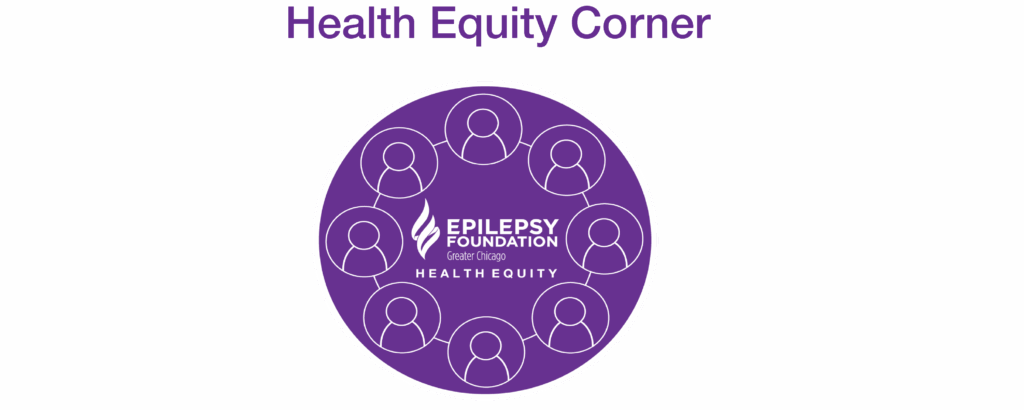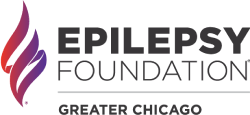
November 2025
Welcome to the Health Equity Corner!
As I write this, we are already halfway through Epilepsy Awareness Month! It’s one of my favorite times of year – a chance to see new purple dresses, neckties, and fun socks show up everywhere in solidarity.
November is also an opportunity to revisit our personal health plans. Do you have a seizure action plan for yourself or your loved one? As we head into the new year, ask yourself, do I have a ‘gold standard of treatment’ for myself or my loved one?
We know that in the Chicago metro area, an estimated 140,000 people live with epilepsy. But not everyone is receiving the advanced level of care they deserve. For example, are all patients being seen by an epileptologist? (An epileptologist is a neurologist with an additional fellowship in epilepsy). As I like to say, for a neurologist, every brain disorder is on the menu, but for an epileptologist, it’s only epilepsy!
We are so fortunate that in this metro area, we have multiple Level 4 and 3 epilepsy centers. If you are currently being seen by a neurologist and you would like a second opinion from an epileptologist, please contact the Foundation for a list of providers. Treatment pathways is another key point we like to consider in the ‘gold standard of treatment’. Once a person has failed 2 or more medications, they are considered eligible for a surgery conversation. Want to learn more? Please visit our YouTube channel for webinars on medications, surgery and more!
In solidarity,
Ayesha
August 2025
Welcome to the Health Equity Corner!
Picture yourself at your last doctor’s appointment. Was it in person or virtual? Was a family member able to accompany you? Sometimes these visits can be stressful to manage. It can be helpful to bring a companion with you to help remember details, ask the right questions and ultimately be your advocate.
A Community Health Worker (CHW) is someone who can help you navigate this event. They can even coach you before the visit and connect with you afterwards to ensure you got all the information needed. They are trusted champions of the community who are advocates for their patients. They help access resources, overcome barriers, and ultimately improve patient outcomes. In Illinois, this role is slowly starting to emerge in hospitals and clinic settings.
At the Epilepsy Foundation of Greater Chicago (EFGC), we offer a comprehensive six-hour training for Community Health Workers. These trainings ensure that the CHWs are equipped to not only recognize seizures and understand first aid, but that they also can address the social determinants of health that can impact patients. Epilepsy is not only a medical diagnosis. For some patients, it can also impact their ability to work, get around town or ability to live independently.
Many people in rural communities do not have access to specialists, and we know patient outcomes could be improved with additional resources. To address this barrier, this year, we are launching a pilot program in Greene County, Illinois to train CHWs in epilepsy care. Our goal is to support those living with epilepsy in that area by providing resources and helping patients get connected to advanced epilepsy care.
We’re also collaborating with Ingalls Hospital in Harvey, Illinois by equipping nurses with educational resources to increase patient education on seizures and epilepsy, as well as how and when to use the emergency department to reduce unnecessary visits.
Stay tuned to follow along on these important projects on raising awareness and increasing epilepsy education and health literacy.
In solidarity,
Ayesha
May 2025
Hello! My name is Ayesha Akhtar, and I’m honored to serve as the Vice President of Health Equity, Education, and Advocacy here at the Epilepsy Foundation of Greater Chicago. Since joining the organization in 2011, I’ve been personally committed to ensuring that individuals and families affected by epilepsy—especially those from historically underserved communities—have equitable access to care, resources, and education.
This department manages all the public-facing epilepsy and seizure first aid education across our service area. We focus on addressing social determinants of health, seeking to eliminate disparities in epilepsy outcomes. We host roundtables and webinars to amplify diverse voices and partners. We attend health fairs and walk in parades to show solidarity with community. Our approach combines outreach, advocacy, education, and strategic partnerships with a strong emphasis on cultural humility and data.
Now, more than ever, with legislation changing, access to funding cut or reduced, we need to strengthen our community to center lived experiences, whether it’s through storytelling, co-creating solutions with community leaders, or developing programs that reflect the diverse needs of the people we serve.
Healthcare is a human right, and it is through this lens we take pride in the free education we provide, and ensuring people have access to the epileptologists they deserve. As we continue to grow, we need you and your stories to be our north star.
Today I am sharing 3 things you can do to advocate for yourself or your loved one from home! 1 – Share your story with the Epilepsy Foundation community to help inspire others and also make sure our elected officials understand the lived experiences. 2 – Reach out to your elected officials to make sure they don’t cut funding for vital programs for epilepsy research and programs. 3 – Reach out to your elected officials to let them know that the proposed funding cuts to transit can have huge consequences for people living with epilepsy. We rely on safe, public transit daily, and WITH funding, riders can get from A to B reliably, and more often.
In solidarity,
Ayesha
